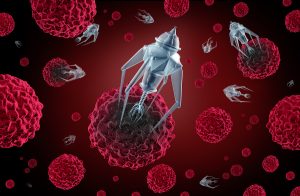Israeli scientists believe they found a new thought model on cancer cure. The heading in the Israeli Post boldly declares ”A cure for cancer? Israeli scientists say they think they found one”. The subheading is even bolder: ”We believe we will offer in a year’s time a complete cure for cancer.”
When you read on, you learn that the company has done some basic research on cancer treatments. The name of the company is “Accelerated Evolution Biotechnologies Ltd.” and the foundation of the company goes back to 2000. In 2019 the heading promises that they have found the cancer cure. But in the text it says they hope that within one year they will find the cure. All these statements don’t quite add up and this dampens your hope for a cancer cure somewhat.
Previous attempts that failed providing the cancer cure
Dr. Ilan Morad, the CEO of the company said that traditional cancer chemotherapy has its limits, because it attempts to inhibit a target on the cancer cell surface or inside the cancer cell. But the cancer cell fights back and the cancer becomes resistant to the treatment.
New approach
Dr. Ilan Morad and his colleague, Dr. Hanan Itzhaki wanted to approach this problem differently. Essentially, the researchers stated that it is better to attack multiple targets on the cancer cell, which they call MuTaTo approach (multi-target toxin). Morad stated: “The probability of having multiple mutations that would modify all targeted receptors simultaneously decreases dramatically with the number of targets used,” Morad continued. “Instead of attacking receptors one at a time, we attack receptors three at a time – not even cancer can mutate three receptors at the same time.” The cancer cell attempts to activate detoxification steps to inactivate the toxin. But when the toxin is powerful enough, it will eliminate the cancer cells.
MuTaTo technology similar to triple therapy in AIDS
Morad explained that the MuTaTo technology would be similar to the triple therapy in AIDS. For AIDS patients this has been the break through. The patient takes a protease inhibitor in combination with two other drugs called reverse transcriptase inhibitors. In the past patients took these drugs one by one, but each became resistant to the treatment. Now the drugs overwhelm the infected AIDS cells, but the normal cells do not get damaged. The MuTaTo technology works similarly against cancer cells. With this technology there is a connection between 12 amino acids in sequence and the main molecule. This is akin an octopus attacking a cancer cell. The peptides are not long enough for the immune cells to attack them, but powerful enough to be toxic to cancer cells.
Phage technology for cancer attack
Most mutations of cancer cells come from mutated cancer stem cells. This means that the anti-cancer peptides of the MuTaTo technology will also kill the cancer stem cells. This technology employs phages, which are viruses that attack bacteria. However, the researchers modified the phages with anti-cancer peptide attachments. The research team completed mouse experiments where they transplanted human tumors into mice. The modified phages eradicated the tumors without attacking the normal cells of the mice. Next they want to do clinical trials on humans, which according to Dan Aridor “could be completed in a few years”. Dan Aridor said:
“Our cancer cure will be effective from day one, will last a duration of a few weeks and will have no or minimal side-effects at a much lower cost than most other treatments on the market,” Aridor said. “Our solution will be both generic and personal.” Aridor added: “Our results are consistent and repeatable.”
Future likely development
Cancer treatments take time to be tested and to be refined. Typically there are 4 phases in clinical trials.
There is a small trial on humans to test the toxicity of a new anti-cancer drug (Phase 1 trial)
Then there is a larger trial on humans where the questions are: which cancer types are responding to the treatment modality, what is the proper dosage, what are side effects and how to deal with them? (Phase 2 trial)
Another trial compares the new treatment with the standard treatment up to this time (Phase 3 trial)
Researcher do the the last clinical trial when the treatment has a licence. More about effects and side effects are investigated. What are the long-term risks and benefits? This is called Phase 4 trial. It is clear from the above that there is still a long pathway from the initial description of the MuTaTo technology to the final product that works in cancer patients. We are at least 5 to 10 years away from a possible success. If there are toxicity problems, the technology would have to be reexamined in the lab, then again reviewed in clinical trials.
Conclusion
Israeli scientists have detected a new potential cancer therapy. It involves bacteriophage technology and a multi target toxin approach in fighting cancer. In essence small peptides are aiming at various cancer cell targets at the same time. Researchers have been testing the technology on mice. Next laborious multiphase clinical trials will have to begin, before it can be declared a safe anti-cancer therapy.
First published here: https://www.quora.com/What-are-opinions-of-Israels-announcement-to-have-discovered-the-cure-for-cancer/answer/Ray-Schilling






